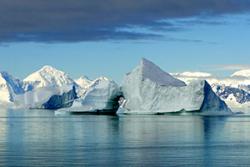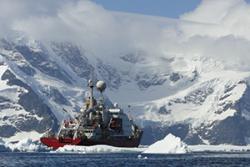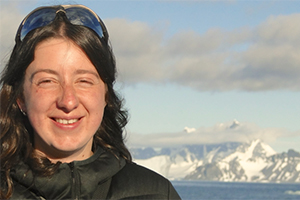Mixing waters up in the Southern Ocean
 This and next image ©Jess Mead Silvester.The Southern Ocean encircles Antarctica and plays a key role in controlling the global climate. It is here that ocean currents return from the abyss to the surface, closing the global ocean overturning circulation. This circulation drives the poleward transport of heat, which is critical to the relatively mild weather here in the UK.
This and next image ©Jess Mead Silvester.The Southern Ocean encircles Antarctica and plays a key role in controlling the global climate. It is here that ocean currents return from the abyss to the surface, closing the global ocean overturning circulation. This circulation drives the poleward transport of heat, which is critical to the relatively mild weather here in the UK.
New research by �鶹��ý����� and the National Oceanography Centre, Liverpool, has for the first time identified a new process that contributes to this upwelling of abyssal water, a key component of the global overturning circulation.
The research, recently published in the leading American Geophysical Union Journal presents the first direct evidence of a hypothesised mechanism that enables the transport of deep waters to the surface over the Antarctic continental slope.
“The ocean interior is stratified, with surfaces of constant density separating the layers of water. In the Southern Ocean, strong winds cause these density surfaces to incline, tilting upwards towards Antarctica. It has long been known that the slow, upward diffusion of waters along these density surfaces is unable to account for all upwelling here. It had been hypothesised that another mechanism - the mixing of heat and mass across these density surfaces- might provide a shortcut,” explains Ocean Physics PhD student Jess Mead Silvester.
 Miguel Angel Morales Maquedas and Jess Mead Silvester returned to the Antarctic Peninsula aboard RRS James Clark Ross earlier this year to deploy an EM-Apex float in the hope of observing more tidal mixing processes.“In fact, we observed very high levels of mixing across the density surface that generally separates the upwelling branch of the global overturning circulation from waters that have already been exposed to the surface and which are on their way northwards. This means that waters are short-cutting the longer route via the surface.”
Miguel Angel Morales Maquedas and Jess Mead Silvester returned to the Antarctic Peninsula aboard RRS James Clark Ross earlier this year to deploy an EM-Apex float in the hope of observing more tidal mixing processes.“In fact, we observed very high levels of mixing across the density surface that generally separates the upwelling branch of the global overturning circulation from waters that have already been exposed to the surface and which are on their way northwards. This means that waters are short-cutting the longer route via the surface.”
“We believe that the interaction of tidal currents with the sea bed on the steep continental slope provided the energy driving the mixing. We think that this process may be occurring over as much as 30% of the Antarctic continental slope, making a significant contribution to the upwelling, and hence the strength of the global overturning circulation.”
Jess’ main supervisor, Dr Yueng-Djern Lenn commented:
“Our ability to predict the strength of ocean overturning and its impact on climate is hindered by poor representation of the mixing processes that facilitate the water mass transformations that drive it. Jess’s work is of particular significance because it challenges the Southern Ocean paradigm by presenting new evidence of a process that is currently missing in our representation of Southern Ocean mixing. Our results further highlight the continental slope regions as being important players in overturning, and the need to take time-series measurements when attempting to resolve intermittent turbulent mixing processes."
 Jess Mead SilvesterPostgraduate student Jess is a former pupil of Ysgol Brynrefail and Coleg Llandrillo where she gained her International Baccalaureate. She graduated in Geography from �鶹��ý�����.
Jess Mead SilvesterPostgraduate student Jess is a former pupil of Ysgol Brynrefail and Coleg Llandrillo where she gained her International Baccalaureate. She graduated in Geography from �鶹��ý�����.
This research forms part of Jess Mead Silvester’s PhD which is supervised by Dr Yueng-Djern Lenn and Professor Tom Rippeth at the , �鶹��ý����� and Drs Jeff Polton and Miguel Morales Maquedas at the National Oceanography Centre, Liverpool. The PhD is funded by the Natural Environmental Research Council.
Publication date: 1 December 2014
